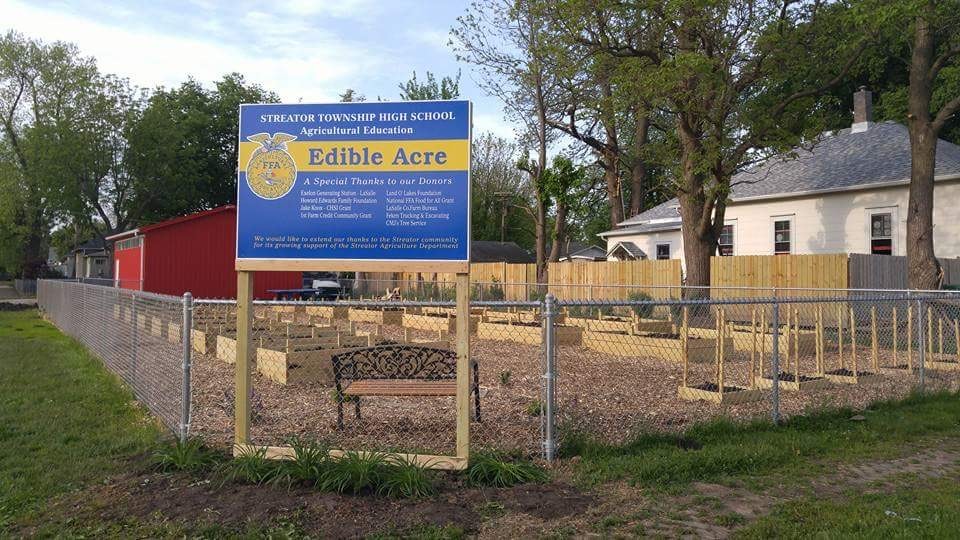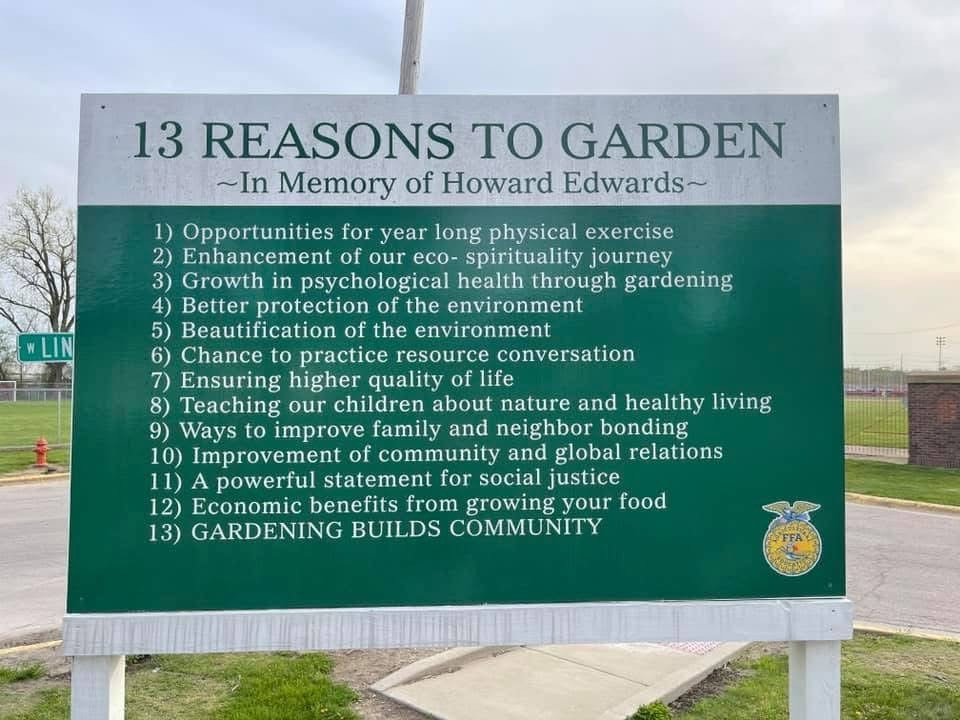
Rooted In Tomorrow
Growing the future with Community Gardens
Since its inception in 2011, the Community Gardens initiative has donated 886,187 pounds of fresh produce to local communities
Just two blocks from Streator Township High School in Streator, Illinois, a garden flourishes with 31 raised beds overflowing with vegetables, a bright red shed and a sign proudly displaying the “13 Reasons for Gardening.” Thanks to a collaborative effort between the Land O’Lakes Foundation, the WinField United Answer Plot team and the Streator Future Farmers of America (FFA) chapter, this green space cultivates more than just produce; it nurtures opportunity, firsthand learning and the growth of tomorrow’s agricultural leaders, all while helping to combat hunger in rural communities.
Across the country, WinField United Answer Plots collaborate with local FFA chapters to grow fresh food for rural food pantries. Through an initiative led by the Land O’Lakes Foundation and the WinField United Answer Plot team, each chapter receives one bag of sweet corn seeds to plant. After harvest, chapters that report their donation totals and demonstrate a good-faith effort receive a $1,000 grant to help sustain the program into the next season.
“Our community gardens are right at the intersection of Land O’Lakes’ commitment to alleviating rural hunger and to supporting ag education,” explains Leah McKeon, senior community relations specialist. “Students in local FFA chapters get ‘on-the-job’ learning while also supporting rural hunger relief by donating their harvest to their nearest food shelves. It’s a beautiful collaboration and a win for all involved. We are grateful to support hunger initiatives across the country.”
Since its inception in 2011, the Community Gardens initiative has donated 886,187 pounds of fresh produce to local communities. In 2024 alone, 14 chapters contributed 31,941 pounds, equivalent to 141,707 servings of fresh produce.
“That produce [students] grow goes straight to the food pantry, which allows us to directly tackle rural hunger through direct experience.”
Riley “Hinch” Hintzsche/agriculture teacher at Streator Township High School

Planting seeds of change
Riley “Hinch” Hintzsche, agriculture teacher at Streator Township High School, brings a passion for hands-on learning that is as vibrant as the sweet corn and squash his students cultivate.“It’s a little chaotic being an ag teacher,” he says, “but it’s really fun. You build connections with people you never thought you would, and you get to watch students become change leaders.”
Hinch arrived in Streator in 2014, when the space now home to the Community Garden was just a parking lot for sporting events. He envisioned a place where students could learn by doing while giving back to a community whose poverty rate rose from 18% to 30% during the COVID-19 pandemic. With $15,000 in community grants, Hinch and the Streator FFA chapter built 31 raised beds and donated over 1,200 pounds of fresh produce to the local pantry during its first year in 2016.
The initial grants helped launch the project, but sustaining the gardens required additional support. That’s when Matt Heberling, Senior Research Manager on the WinField United Answer Plot team, introduced Hinch to the Community Gardens grant.
“Agriculture is a tight circle, Hinch and I met through mutual friends in college. I knew he was passionate about everything that he did, and when we were looking for an FFA partner I felt that he would be a good fit.”
Since joining the program, the Streator FFA chapter has donated over 10,000 pounds of grown produce to their local food pantry.

A list of 13 reasons to garden, in memory of Howard Edwards.
Rooted in the community
At the garden in Streator, students start seedlings in March, plant in May, then spend their summers tending to the crops.
“We pay students to work in the summer, so we’re not just growing food, we’re investing in our local economy,” Hinch explains. “That produce they grow goes straight to the food pantry, which allows us to directly tackle rural hunger through direct experience.”
The gardens, located just two blocks from the school, have become a community landmark, building connections between current students and the greater community. Each summer and fall, alumni of the Streator FFA program return to mentor current students and help in the garden, including one former member, now working at a local farm store, who generously donates seeds to support the program’s continued growth.
“It’s a two-way street of giving and giving back,” Hinch says. “That’s where the magic happens.”
For Matt, the gardens are a natural extension of Land O’ Lakes’ mission to create sustainable solutions for the future while benefiting farmers and rural communities.
“We’re deeply committed to addressing rural hunger,” he says. “This program lets us directly serve the communities where our members live and work. It’s a way to get back to our roots as a farmer-owned co-op.”
Growing future leaders
The impact of the gardens goes far beyond their visibility. Hinch explains that one of the most meaningful aspects of the garden is its ability to expose kids to agriculture.
“Every fall, I ask a new student to pick something and eat it straight from the garden” he shares. “They look at me like I’m nuts. They’ve never had the opportunity to do that before. But then they take a bite and say, ‘Can I have another one?’ That’s when I know we’re doing something right with our program.”
As one of the original specialists who helped launch the program, Matt has seen firsthand how the gardens empower the next generation of leaders.
“FFA students are our future members, owners and employees. Through these grants, we are not just funding gardens, we’re funding leadership, education, and opportunities for rural communities.”
By fostering direct learning and community involvement, this program is planting seeds for a brighter, more resilient future.
